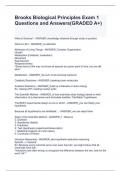-
1. Exam (elaborations) - Brooks final exam questions & answers 100% correct
-
2. Exam (elaborations) - Brooks exam questions and answers 100% accurate
-
3. Exam (elaborations) - Brooks biological principles exam 1 questions and answers(graded a+)
-
4. Exam (elaborations) - Brooks biodiversity unit 1 exam questions and answers (rated a)
-
5. Exam (elaborations) - Brooks exam 3 questions and answers(scored a)
-
6. Exam (elaborations) - Brooks biodiversity unit 2 exam questions & answers 100% verified
-
7. Exam (elaborations) - Brooks biological principles exam 4 questions & answers 100% verified
-
8. Exam (elaborations) - Brooks biological principles exam 2 questions and answers 100% accurate
-
9. Exam (elaborations) - Professor brooks exam 3 questions and answers 100% correct
-
10. Exam (elaborations) - Biological principles: unit 1 exam (brooks) questions and answers (graded a)
-
11. Exam (elaborations) - Brooks biodiversity exam 1 questions and answers(rated a +)
-
12. Exam (elaborations) - Bio principles unit 1 exam brooks fau questions and answers 100% correct
-
13. Exam (elaborations) - Brooks biological principles exam 1 questions and answers(scored a+)
-
14. Exam (elaborations) - Brooks biological principles exam 3 questions and answers 100% accurate
-
15. Exam (elaborations) - Brooks exam 4 questions with complete correct answers
-
16. Exam (elaborations) - History 105 brooks exam 1 questions and answers 100% accurate
-
17. Exam (elaborations) - Ecu anthropology exam #1 brooks questions and answers 100% accurate
-
18. Exam (elaborations) - Eternal families brooks exam 1 questions and answers 100% correct
-
19. Exam (elaborations) - History 105 exam 1 brooks complete with complete solutions!!
-
20. Exam (elaborations) - Brooks bio principles exam 2 study guide with complete accurate solutions!!
-
21. Exam (elaborations) - Brooks- final exam (ch 13, 14, and 15) questions and answers (graded a)
-
22. Exam (elaborations) - Genetics: dr. brooks exam 1 questions and answers 100% verified
-
23. Exam (elaborations) - Brooks final exam pg 130 questions and answers 100% correct
-
24. Exam (elaborations) - Biological principles exam 3 brooks questions and answers 100% correct
-
25. Exam (elaborations) - Brooks exam 2 key terms questions and answers 100% accurate
-
26. Exam (elaborations) - Brooks biodiversity exam #2 questions and answers 100% accurate
-
27. Exam (elaborations) - Brooks biodiversity unit 2 exam questions and answers 100% solved
-
28. Exam (elaborations) - Ccjs 340 brooks exam 1 questions and answers 100% correct
-
29. Exam (elaborations) - Fau brooks biodiversity unit 1 exam questions and answers (scored a+)
-
30. Exam (elaborations) - Brooks biodiversity exam 3 questions and answers (rated a)
-
31. Exam (elaborations) - "hist 105 brooks exam 3 questions and answers(graded a)
-
32. Exam (elaborations) - Finance - review exam (bob brooks) exam questions and answers 100% accurate
-
33. Exam (elaborations) - History 105 charles brooks exam i questions and answers 100% accurate
-
34. Exam (elaborations) - Unit 2 biodiversity exam (brooks) questions and answers 100% correct
-
35. Exam (elaborations) - Brooks biodiversity exam 4 fau questions and answers 100% accurate
-
36. Exam (elaborations) - Brooks biodiversity exam 4 fau questions and answers 100% accurate
-
37. Exam (elaborations) - Bob brooks national practice of real estate exam questions with complete solution
-
38. Exam (elaborations) - Biodiversity exam 3: dr. brooks fau questions and answers(graded a)
-
39. Exam (elaborations) - State practice exam- 1 (bob brooks) questions and answers 100% correct
-
40. Exam (elaborations) - Unit 3 exam review- brooks (fau) questions and answers 100% verified
-
41. Exam (elaborations) - Brooks test 2 exam questions and answers 100% correct
-
42. Exam (elaborations) - Brooks study test review exam questions and answers 100% correct
-
43. Exam (elaborations) - State practice exam- 3 (bob brooks) questions and answers 100% correct
-
44. Exam (elaborations) - Coach brooks ch.4 test review with complete solution latest updated
-
45. Exam (elaborations) - Geol 100 brooks britt exam 1 questions and answers 100% correct
-
46. Exam (elaborations) - Contracts - review exam (bob brooks) with complete solution 100% verified
-
47. Exam (elaborations) - Bob brooks national finance exam questions with verified answers latest updated 2024
-
48. Exam (elaborations) - Mr. brooks test review with answers 100% solved
-
49. Exam (elaborations) - Mr. brooks test review with answers 100% solved
-
50. Exam (elaborations) - Title records and closing procedures - review exam (bob brooks) with accurate answers
-
51. Exam (elaborations) - Bob brooks national valuation exam questions with answers rated a+
-
52. Exam (elaborations) - Bob brooks national transfer of title exam questions and answers 100% accurate
-
Show more




